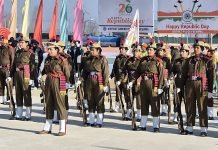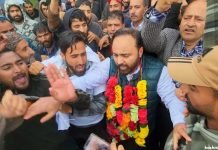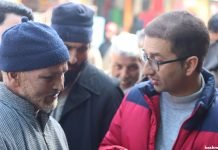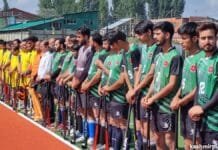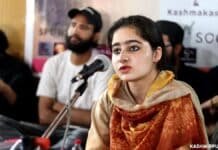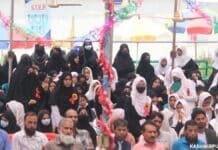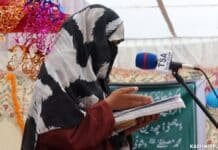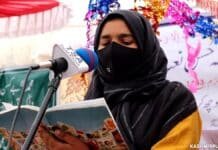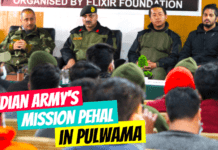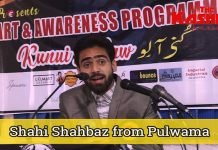SRINAGAR — Jammu and Kashmir’s Chief Electoral Officer P K Pole on Wednesday said that the first phase of Assembly elections recorded 59 per cent polling with a possibility of a fractional increase to the figure.
“Total poll percentage for the first phase of Assembly polls was 59 per cent with a fractional increase very much possible. This time, we worked out district-wise figures as earlier one Assembly constituency was spread over two districts. Post delimitation exercise, no Assembly constituency is spread in two districts,” Pole said.
He said the polling percentage has come from the 3276 polling booths and 23 special polling booths—19 in Jammu and four in Delhi for the migrant voters.
He said the Election department of J&K has worked out percentage figures from districts. “I am glad to share that the South Kashmir districts have witnessed huge voter turnout. The areas in South Kashmir would otherwise witness a low percentage of even single digits. Since Lok Sabha polls were held in April-May, the voting percentage from South Kashmir districts increased significantly,” the J&K CEO said. “I am sure that in the next two phases, the voting percentage will be much higher than today.”
Sharing the district-wise percentage, Pole said Anantnag district recorded 54.17 per cent voting, Kulgam 61.7, Pulwama 46.03 and Shopian 53.64. “In Jammu, Doda district recorded 69.33 per cent voting, Kishtwar 77.23 and Ramban 67. 71 per cent voting,” he said.
He said in Kashmir, Kulgam recorded the highest voter turn and in Jammu, Kishtwar district topped the list. “Today’s voting percentage is higher than previous elections held in 2009, 2014 and 2024 (Lok Sabha polls) and 2008, 2014, 2024 (Assembly polls),” Pole said.
Doling out the Assembly constituency-wise poll percentage figures, Pole said that in Kashmir, Shopian recorded 54.72 percent voting, Zainapora 52.64 percent, D.H.Pora 68 percent, Devsar 57.33 percent, Kulgam 62.70 percent, Anantnag 41.58 per cent, Anantang West 45.93 percent, Dooru 57.90 per cent, Kokernag 58 percent, Pahalgam 67.86 per cent, Shangus-Anantnag East 52.94 percent, Pampore 44.78 percent, Pulwama 50.42 per cent, Rajpora 48.07 percent and Tral 43.21 percent.
“In Jammu, Bhaderwah recorded 65.27 percent voting, Doda 70.21 per cent, Doda West 74.14 percent, Inderwal 80.06 percent, Kishtwar 75.04 and Padder Nagseni 76.80 per cent,” Pole said
To a query, whether any untoward incident was reported anywhere in J&K, Pole said no incident was reported to an extent where a re-poll should be done. “Minor incidents were reported in Kishtwar where the Deputy Commissioner took the cognisance and the issue was resolved,” he said. “Central forces and police acted swiftly as well.”
He credited the highest voter turnout to the peaceful environment, vigorous campaigning by candidates and massive awareness campaign launched by the Election department of J&K. “The Election department held a series of awareness campaigns across J&K which will continue for the phase-two and phase-three as well,” the CEO J&K said.
Boycott a history, ballot future: J&K’s first phase elections woos voters in bulk
Jammu and Kashmir on Wednesday witnessed a historic event as the ballot attracted voters in bulk including those who had never voted so far.
Today was the first election in a decade and first after the revocation of Article 370 and the first also in J&K as a UT. Nevertheless, there was huge participation in all 24 Assembly segments.
Once marred by boycotts and the looming threat of terrorism, Kashmir was seen celebrating its democratic rights with a renewed sense of hope after 10 years.
As per the news agency KNO, voting took place for 24 Assembly seats across seven districts in Jammu and Kashmir, including areas that were once reluctant to participate in the electoral process.
This time, however, districts such as Shopian, Tral, and Pulwama—often in the shadow of insurgency—saw an enthusiastic voter turnout. What makes this election particularly notable is not just the 10-year gap, but also the transformation of the electoral landscape post-Article 370, a change that has injected fresh optimism into the region.
The first phase of the election held on Tuesday concluded with an overall polling turnout of 58.85%. A comparative analysis of voter turnout reveals the changing political dynamics of Jammu and Kashmir. For instance, Anantnag saw a rise from 39.7% in 2014 to 54.17% in 2024, while districts like Pulwama, often hit hardest by conflict, experienced an increase from 38.1% in 2014 to 43.87% this year.
Jammu and Kashmir’s Lieutenant Governor Manoj Sinha expressed his gratitude to voters for participating in what he called a “historic voter turnout.” He highlighted the significance of the elections as a testament to the strength of Indian democracy, noting the region’s transformation from fear and conflict to one where voters proudly exercise their democratic rights.
In his tweet, Sinha said, “Record polling in the peaceful, free and fair election attests to the strength of Indian democracy & people’s faith in democratic values.” He also praised the efforts of security forces, the Jammu and Kashmir Police (JKP), and election officials, while commending first-time voters, particularly women, for coming out in large numbers.
For this election, a total of 219 candidates competed across 16 Assembly constituencies in the Kashmir division and eight constituencies in the Jammu division. Over 23.27 lakh voters were eligible to cast their votes, with 3,276 polling stations set up to ensure a smooth voting process. The districts where voting took place included Anantnag, Pulwama, Shopian, and Kulgam in the Kashmir division, and Doda, Ramban, and Kishtwar in the Jammu division.
Demographics played a crucial role in this election, with a significant proportion of young voters between the ages of 18 to 29 years, including 1.23 lakh first-time voters. Notably, the election also saw the inclusion of 60 third-gender voters and 28,309 persons with disabilities (PWD), indicating the region’s efforts toward an inclusive democracy.
In terms of voter turnout by district, Anantnag, a critical region in Kashmir, registered a 54.17% turnout, while Doda in Jammu, known for its high voter engagement, saw 63.33%. Despite a marginal dip in areas like Kishtwar and Ramban, with 77.23% and 67.71% turnout respectively, the overall sentiment remained one of participation and engagement. Other key districts like Kulgam and Shopian also witnessed respectable turnouts of 59.62% and 54.64%.
Polling was held in assembly constituencies such as Pampore, Tral, Pulwama, Shopian, Kulgam, and several others across both divisions. Each of these constituencies saw candidates from various political backgrounds compete for seats, reflecting the diversity of political thought and the multi-faceted nature of Jammu and Kashmir’s electoral landscape.
For many, this election was not just about voting, but about reclaiming a sense of agency and participation in the democratic process. For years, the region struggled with the fear of terrorism and the weight of political instability, but today’s election signals a shift towards normalcy and a brighter, more democratic future.
With approximately 59% turnout in the first phase, the region has made a powerful statement about its faith in democracy. Voters from all walks of life, including the elderly and first-time voters, stood in long queues, undeterred by past fears or political uncertainties. The image of these voters, from districts like Doda and Anantnag, casting their ballots serves as a symbolic rebuke to the adversaries of peace and democracy, and a firm reaffirmation of Jammu and Kashmir’s place within the democratic framework of India.
Elections through the eyes of Veteran voters: ‘Most winning candidates forget us, only a few fulfil promises’
Pulwama district of South Kashmir has seen a huge transition over the years. On Wednesday, serpentine lines were seen outside the majority of polling booth of this politically significant Assembly constituency of Kashmir. What caught the attention of the media were the Octogenarian people, some of them on wheel-chairs and some taking the help of sticks to reach out to the polling booths to cast votes.
While talking to news agency KNO, Ghulam Muhammad, 82, said: “I don’t feel anything will happen. Nothing has happened in the past 50 years. Most of the winning candidates forget their voters. Only a few remember us. Very few fulfil promises. Many of them don’t allow us to enter their homes after they win.”
Asked despite having bitter experience that nothing happens, why he chose to vote this time too, he said maybe better sense prevails. “Who knows my vote may change the heart of the candidate I have voted for. It’s better to try luck, who knows whether I will be alive next time,” he said. “If the candidate for whom I voted for wins, I will catch-hold of him tomorrow and ensure my children and grandchildren get jobs.”
His wife, Khadija, 80, however, differed with her husband. “It’s true that nothing has happened in the past. But this time, it seems candidates in fray are sincere and won’t forget the voters. Wasting a vote is not a good suggestion,” she said.
Another octogenarian Ali Muhammad Alai, a resident of Kakapora, Pulwama claimed that he had come to vote to get back his land retrieved by the J&K administration two years ago. “When late Jawahar Lal Nehru visited Kakapora, Pulwama he asked us to use the land for growing paddy and other crops. It was the Bakshi Ghulam Muhammad who installed a water pump shed in Kakapora for water supply to the fields. Ghulam Nabi Azad initiated the process of giving us ownership rights of the land under our use for decades but the process stalled after his government was toppled.”
Alai said two years ago, LG Manoj Sinha led administration retrieved almost 30 acres of land from us and other villagers. “We protested but got lathis. Now, I have voted to get back the land,” he said.
A group of elderly people present on the occasion stated that sadak, pani and bijli will continue to remain issues to be resolved by the candidate who wins.
First-timers in Anantnag’s Omoh hamlet vote for jobs, ‘restoring’ rights
As the ten-year wait for assembly elections ended, the voters in Omoh hamlet in the Dooru segment in south Kashmir’s Anantnag district were enthusiastic and happy to cast their ballots for the first time after the bifurcation of the erstwhile J&K state.
Speaking with the news agency KNO, one of the voters, Riyaz Ahmad Padder, at Polling Booth-41, said, “We feel happy and joyous to choose our representative after a gap of ten years. The people were so eager that they even arrived at the polling booth before it opened.”
Ahmad said voters were turning out for multiple reasons. “Primarily, we have been observing the manifesto of every political party, and this time we are voting to choose our own representative who will work on restoring the rights that have been taken from us,” he said.
Meanwhile, a 68-year-old voter, Mohammad Fareed, at the Omoh polling station said, “I am casting my ballot for development.” Fareed added that he has never missed a chance to vote.
At this polling booth, several first-time voters expressed their hope that the local representative they elect will work to provide jobs.
One first-time voter, Mohammad Shareef, said, “I am optimistic that my vote will bring positive change. I am choosing a representative who will speak on our behalf and address the unemployment in the area.”
Another first-time voter, Tawseef Ahmad, said, “I cast my ballot to choose the representative who will work on restoring Article 370.”
Ahmad added, “The abrogation of Article 370 has led to unemployment here, and I believe that choosing the right representative can help reverse this decision.”
‘Crops can wait, voting can’t’: Kulgam voters show up in large numbers despite harvest season
Despite the ongoing apple and paddy harvest season, residents of south Kashmir’s Kulgam district turned out in impressive numbers to cast their votes in three key assembly segments. While the fields were bustling with activity, voters made time to participate in the democratic process.
Among the voters was Abdul Majid, a labourer working in a paddy field. “It is a crucial time for us as the paddy needs to be cut and transported to threshing yards, but this vote is even more important. Our future is at stake, and we cannot miss this opportunity to choose our representatives,” he said while speaking to the news agency KNO.
Another local labourer, Bashir Ahmad, said. “The apple harvest is in full swing. I have been picking apples for the past couple of days, but early this morning I rushed here to vote. We labour all year in these orchards, but if we don’t vote, our voices won’t be heard.”
The sight of voters still wearing their work clothes was common, as women and men alike stepped away from their fields and orchards to join the polling lines.
Shakeela Bano, who had been busy in an orchard earlier, said, “It is exhausting to balance both harvesting and voting, but this is our right. We may be labourers, but we understand the value of our vote.”
Mohammad Yousuf, an apple picker from Yaripora village, said, “The crops can wait for a while, but voting can’t. We don’t get many chances to elect a leader here—it takes years, so this election is important.”
The district comprises three assembly constituencies: D.H. Pora, Kulgam and Devsar, with 3,28,740 registered voters, including 1,64,829 males, 1,63,898 females, and 13 transgender voters.
Overall, Kulgam district recorded an approximate voter turnout of 62.61 percent.
D.H. Pora Assembly segment recorded the highest voter turnout in Kulgam at 68.43 percent, followed by Kulgam at 62.74 percent and Devsar at 57.34 percent.
Elderly voters in Pulwama, Shopian seek employment for children, lower electricity bills
Elderly voters in south Kashmir’s Pulwama and Shopian districts said they cast their votes for the employment of their children and the lowering of electricity bills.
Speaking to the news agency KNO at various polling stations, elderly voters expressed concerns about the rising unemployment in J&K. They sought an employment package for the region.
Mohammad Shaban (60), a resident of the Chandgam area of Pulwama, told KNO that their qualified children have been waiting for jobs for years and are now close to exceeding the age limit for employment.
He said the prolonged unemployment has led to mental health issues for many and that thousands of qualified youth are facing similar struggles.
“I am voting so that our qualified youth will get jobs as soon as possible. The inflation has also burdened the poor, which needs to be addressed,” he said.
Saleema Bano (58), another voter from the Zainapora area of Shopian, said they voted solely for the employment of their children and are hopeful that elected representatives will work to create more job opportunities.
Mohammad Akbar (65), a retired teacher from Pinglena, Pulwama, said that around 11 lakh youth are unemployed in J&K, and he voted with the hope that unemployed youth, present in almost every family, will secure jobs.
“Poor people have been suffering due to inflation and the frequent increases in electricity tariffs. Whoever wins must work on reducing electricity costs,” he added.
Other elderly voters echoed similar sentiments, saying they voted for development and employment. “We have voted so that employment, resources, and other opportunities will be reserved for locals and to lower the unemployment rate,” they said.
They expressed hope that their candidates would meet their expectations and address the real issues on the ground instead of misleading the assembly.
“For a long time, most politicians have misled us, but we hope that people across J&K will choose their candidates wisely so that genuine issues like unemployment and inflation will be resolved,” they added.
On Kulgam’s fertile turf, a direct battle between an old horse and new face
A decade-long political silence ended Wednesday for Kulgam in South Kashmir, leaving the people of this region at a decisive turn. Known historically for its mixed political atmosphere — a mix of boycotts and thin voting margins — the seat has always voted for CPI (M) leader M Y Tarigami who has been elected four times in the past from the constituency.
But the political landscape has turned out to be completely different, as the Jamaat-e-Islami-backed candidate, Sayar Ahmed Reshi has not joined the fray but has posed the biggest challenge for veteran Tarigami.
The question is: Will Kulgam once again go to its old leader or will the electorate look for some new leadership that will lead them forward? “I am with my people and they are with me. I hope more people participate in this democratic festival that marks a return of the event after a decade to Kashmir,” the optimistic Tarigami told the news agency KNO, after casting his vote.
His rival, Sayar Ahmed Reshi, also sounded upbeat in his comments after casting their vote, stating that the turnout had been high and the people’s morale was upbeat. “I have cast my vote with full confidence, and the enthusiasm of the people is heartening,” Reshi said. The participation of JeI in the political process, after a long hiatus since 1987, has stirred much excitement, especially after a massive rally in Kulgam last week that shook the political scene in Kashmir.
One of the most dramatic reversals of the traditional long-held boycott trend in many parts of Kulgam is this election. Bugam is a village known hitherto for no votes being cast at all today, had long queues of voters at the polling booths. “We have realized that boycotting the polls did nothing for us. Today, I use my vote for peace, prosperity and a future free of violence,” he said.
Lateef Ahmed Dar, a voter from Bugam who, at 50 years old, cast his first ballot, said, “We have lived in too much fear of others. It is a promise of an end to that.”
Other erstwhile rebel districts that are prone to boycotts, like Redwani, Frisal, and Qaimoh, also cast their votes very enthusiastically. Women, elderly, and first-time voters are eager to exercise their franchise. “Change is bound to happen, and we are voting for it. We have lived enough bloodshed and fear. That’s what this vote indicates about wanting to see an end to all that,” said Javaid Ahmed, a young voter from Redwani.
As Kulgam welcomes this rare moment of political engagement, only time will tell whether the people will hand over their trust in the experienced Tarigami or welcome an era of change at the hands of Reshi.
Sikhs in Anantnag vote for minority status, inclusion of Punjabi as an official language
During the first phase of assembly elections, members of the Sikh community in various villages in south Kashmir’s Anantnag district cast their votes, hoping that the new government will grant them minority status.
Voters expressed to the news agency KNO their desire for a representative who will advocate for the inclusion of Punjabi as an official language.
Sadbir Singh Sodi, a voter at the Bongund polling station in the Mattan area, said, “In the past, we have been overlooked by every government. This time, we are optimistic about being granted minority status, which would provide us with job reservations in Jammu and Kashmir.”
He said the Sikh community has long sought the recognition of Punjabi as an official language, but their requests have largely gone unaddressed. “In Anantnag district alone, Sikhs reside in 14 villages, yet we often feel taken for granted,” he added.
Another voter, Tablog Singh, said, “Development is the right of every individual but there are some specific demands of the Sikh community which need to be addressed.”
“The long-standing demands for minority status and the inclusion of Punjabi as an official language must be prioritised once the new government is in place,” he asserted. “We came to the polling booths with the hope of finally having our issues resolved.”
Pahalgam voters seek ‘further’ dev in scenic tourist destination
Voters in Pahalgam, a bustling tourist destination, showed enthusiasm as they participated in the first phase of assembly elections. Their only desire is to see development in the scenic locale.
Speaking to the news agency KNO, residents said their primary motivation for voting was the development of Pahalgam.
“Development is our only priority. Regardless of who wins, Pahalgam must be enhanced to attract tourists from across the country and around the globe,” said Abdul Rahim, a local voter.
Many residents in Pahalgam are employed in the tourism sector, and Rahim said there is a need for further growth in this area to support their livelihoods.
“We cannot expect a boom in tourism without the development of our attractions; it’s crucial to beautify these destinations to draw more visitors to Kashmir,” he added.
Another voter, Ashiq Ahmad said, “Though progress has been made so far, much more needs to be done. “While much has been achieved, there is always room for betterment. We hope the winning candidate will initiate the development process as soon as the new government takes office in Jammu and Kashmir,” he said.
Tral records 40% voter turnout, higher than 37% in Parliament elections
Voter turnout in the Tral area of Pulwama during today’s Assembly elections reflects a pattern similar to last parliamentary elections which recorded around 37.52% participation. Residents from Tral, Awantipora and Pulwama actively cast their votes in the first phase of the polls held in Jammu & Kashmir after nearly a decade.
Mixed demographics were seen at polling stations, with men, women and the elderly stepping out to fulfil their civic duty.
Reports obtained by the news agency KNO indicate strong participation in the Tral area. By afternoon, the Government Middle School Khnankah polling station reported 256 votes cast out of 850 registered voters.
At polling booth 56 in Awantipora C, 310 out of 849 registered voters had exercised their franchise by midday, with 437 males and 412 females participating. In polling station 49-Jawbrara, with 1,288 registered voters, 494 had voted by the afternoon. The Townhall Awantipora polling station 58 recorded 300 votes from a total of 1,140 voters, including 537 males, 603 females, and 17 migrants.
Although morning turnout was higher, the numbers dipped in the afternoon before slightly increasing during the late hours.
The Government Higher Secondary School Noorpora Awantipora, an area known for militancy, saw 778 votes cast out of 3,311 registered voters. This location has four polling booths: booth 62 with 142 votes, booth 63 with 229 votes, booth 64 with 227 votes, and booth 65 with 180 votes. The presence of over 500 migrant voters also impacted the turnout.
Dr Harbaksh Singh, who recently left the People’s Democratic Party (PDP) and joined the Awami Ittehad Party (AIP), expressed his satisfaction with the youth turnout at Government Middle School Khnankah. “Their participation is crucial for meaningful change,” he said.
As a current District Development Council (DDC) member, Singh urged voters to reject family-based politics and make their voices heard. He criticised other political figures for “aligning” with the Bharatiya Janata Party (BJP).
Local resident Anas Khan from Awantipora expressed optimism about the voter turnout. “It’s encouraging to see so many people participating today, especially young voters committed to shaping our future,” he said.
Another young man from Noorpora Tral, who preferred to remain anonymous, said that locals are voting for self-governance, the release of loved ones from jail, and the liberation of PSA detainees. “We, the people of Tral, want to see the development of Kashmir, and for that, we cast our votes,” he said.
According to official data obtained by KNO, Pulwama-34 recorded a turnout of 50%, while Tral-33 saw 40%. Alongside the energetic youth, many elderly voters, some using walking sticks, also made their way to the polling booths to participate in the elections.
In Anantnag, NC-Cong alliance workers caught in a fix over casting ballots
In the seven assembly segments of Anantnag district, the workers of two coalition partners – National Conference and Congress – were caught in a fix with regard to casting their ballots in favour of the alliance candidates.
The people in seven constituencies told the news agency KNO that the workers from the alliance groups did not turn up in large numbers like in previous elections.
“Soon after the seat sharing was announced, many of the workers extended their support to independent candidates while many others did not turn up today to cast their ballots,” locals in Anantnag (West) said.
In constituencies where Congress candidates were nominated, NC workers expressed their dissatisfaction, and a similar sentiment was echoed in areas where NC candidates were fielded.
“There are many loyal voters in our constituency who have always participated, but this time, the joint candidate has pushed them aside,” said Mohammad Ramzan, a resident of the Kokernag (ST) constituency.
He added that an independent candidate, who did not receive a mandate from the party, has garnered significant support from party workers.
“This division of votes is a result of the workers being caught in a difficult position,” he said.
No large queues at Mehbooba Mufti’s home turf
While the first phase of assembly polls in Jammu & Kashmir began this morning, large queues were “missing” at the home polling station of former chief minister Mehbooba Mufti in the Srigufwara-Bijbehara segment.
According to the news agency KNO, large queues were witnessed at almost all polling stations across the 24 assembly constituencies since morning.
However, the situation was quite different at Mehbooba Mufti’s home polling station, where no such queues were seen until 11:00 am.
As per official details, by 10:30 am, a total of 77 votes had been cast out of 362 registered voters, which included 171 male and 191 female voters.
Voters were seen arriving one by one to cast their ballots.
Anantnag West: At Thajiwara, people aghast at delimitation of constituency, many abstain from voting
Despite a turnout of 50 percent at Thajiwara in the Anantnag West constituency, many voters expressed dissatisfaction with the recent delimitation of the constituency, which led some to abstain from voting due to their preferred candidates running in different areas.
According to the news agency KNO, many residents were sitting outside polling booths B and C at Thajiwara, claiming that several regular voters have preferred to stay away from the voting exercise this time.
“The delimitation exercise has bifurcated a large part of this constituency, causing leaders to opt to contest from another assembly segment, which has hurt the sentiment of voters here,” said Sajad Ahmad, a local.
He added that regular voters are not inclined to cast their votes in favour of candidates they barely know. “Some leaders have done good work for the people here, and it is difficult for voters now to trust individuals they hardly know,” he added.
Ahmad said these polling booths usually witness a good voter turnout, but this time the mood is different, as the candidates in the electoral race are unfamiliar to the voters.
“It will take time to build trust in the new candidates. However, many voters still turned up to ensure that the party they are affiliated with or supporting in this election would win,” he said.
Kulgam breaks boycott shackles: Once deserted, polling booths come alive with serpentine queues
The areas that were known for boycotting the elections in the past in this picturesque district of Kulgam in South Kashmir on Wednesday came alive with serpentine queues with voters showing great enthusiasm. The voters, the majority of whom were first-timers, claimed that boycotts haven’t yielded anything in the past and it’s time to use vote power to ensure peace, development and fearless living.
Talking to news agency KNO exclusive, Nisar Ahmed Sheikh, said he has never cast his vote in the past as like others he believed in “boycott politics.” “We have realised that boycotts haven’t yielded anything in the past. Better to use the vote as a tool to make our candidate accountable for so many things ranging from development to ensure better living for the residents,” said Sheikh, a resident of Bugam village of Kulgam.
Village Bugam was known for staying away from polls in the past so many years but today a change was visible to all. Like Sheikh, there were many voters, in their 40’s, 50’s and even 60’s, who didn’t cast a vote in the past but were desperately waiting for their turn to cast their vote this time. “Our vote is for change. Boycotting polls is not a wise decision. We have to use our vote cautiously for a candidate whom we can catch-hold tomorrow if he refuses to fulfil our demands,” said Abdul Aziz, another Bugam resident.
Riyaz Ahmed Khan, another resident of Bugam said they are voting for a change. “We want to live a peaceful life far from fears. “We have seen bloodshed in the past so many years and it’s time to live in peace now. We are sure that our vote will bring change and end fear from our lives,” he said.
Adjoining villages of Bugam that include Paniwaich, Frisal, Qaimoh and Redwani were once strong bastions of separatists where very less per cent of voting was a normal routine. But today, long queues were seen outside the polling booths in these areas too with people—elderly, women and young voters waiting for their turn to exercise the franchise.
Apart from the political stalwart M Y Tarigami, who hasn’t lost elections from Kulgam Assembly constituency for the last four terms, the first-time Jamaat-e-Islami backed independent Sayar Ahmed Reshi is also in the fray who has made the contest interesting. PDP’s Muhammad Amin Dar and Peoples Conference candidate Nazir Ahmed Laway are also fighting against Tarigami in Kulgam Assembly seat where contesting is turning out to be a thrilling one.
Follow Us
The Kashmir Pulse is now on Google News. Subscribe our Telegram channel and Follow our WhatsApp channel for timely news updates!


